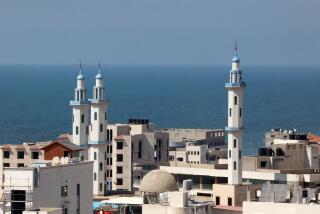To the Arabs, This Crusade Too Will Fail
- Share via
WASHINGTON — On Sept. 16, 2001, only five days after the apocalypse, President Bush proclaimed a U.S. “crusade” against terrorism. Like many American politicians in our history, from Thomas Jefferson to abolitionist William Lloyd Garrison, from Dwight D. Eisenhower to John McCain, he was using the term loosely. In the American political parlance, a crusade, up to now, has meant merely a passionate campaign of moral rectitude.
For the Arab world, as we are learning, “crusade” has an entirely different meaning. In using the word, Bush scratched a raw sore of Arab resentment and handed Muslim fundamentalists a great gift: They could now use the U.S. president’s own words in casting the struggle as another Western crusade against Arab lands and Islam itself. Bush’s gaffe ensured that the terms of the conflict between the West and the East were defined at the outset: Christianity against Islam, Western materialism vs. Eastern spiritualism. With his talk of preemptive attack and occupation, Bush fed the Arab view of him as the quintessential Western crusader.
Somewhere, perhaps in northwest Pakistan, Osama bin Laden is cheering. He has achieved the clash of civilizations he dreamed of fomenting.
In the West, it is hard to grasp why events that happened nearly a millennium ago still dominate Arab perceptions of Europeans -- and, by extension, Americans. There were five principal Crusades in medieval times, stretching over 200 years, and all aimed at “liberating” Christianity’s holiest sites from Muslim control. And though each was unique, they had one thing in common: In one way or another, they were all failures.
This is a primary reason Arabs are drawn to this ancient lore. Memory is long in that part of the world, and resentment runs deep. Many Arabs put great faith in a mysterious process they call “the forces of history.” Western armies may commit aggression in the sands of the Middle East. They may kill many Arabs, and they may stay for years, even decades. But ultimately they will leave or become absorbed.
Of the five Crusades, the first and third are the most important. In the first, from 1095 to 1098, Jerusalem was wrested for a time from its Arab defenders. But massacre and sanctimony tainted that military victory. When the crusaders poured over the walls of Jerusalem, they slaughtered thousands of Arabs and Jews who remained in the city. Then, with the streets ankle deep in blood, the victors repaired to the Holy Sepulcher and dropped to their knees in piety and self-congratulation. The Christian God, they said, had guided their hand.
The first Crusade led to the establishment of the Latin Kingdom of Jerusalem, which remained in place for 80 years, supported by a daunting network of crusader castles whose ruins today are a marvel of the Middle East. The building of those castles nearly bankrupted Europe, but money for the occupation was not the only problem. After the victory, finding volunteers to stay and populate the cities and the fortresses proved difficult. Had the soldiers not accomplished what they came to do?
In its 80 years of existence, from 1098 to 1187, the Latin Kingdom of Jerusalem never had peace. Western aggression and occupation, coupled with a threat to Islam itself, triggered the Muslim concept of jihad. In its purest sense, jihad is defensive. It is written in the Koran: “And fight in Allah’s cause against those who wage war against you, but do not commit aggression -- for verily Allah does not love aggressors.” In the Islamic credo, aggression is the key. To defend against Western aggression and occupation is a sacred duty.
In the last 18 months, jihad has become just as confused as crusade in the American mind. At first, Bin Laden and other violent Arab extremists appropriated and co-opted the concept of jihad. In much of the American press, any Arab with a bomb and a grudge is considered to be on a jihad, regardless of his support among the wider public.
What about mainstream Islam? It has taken the American threat of imminent war to persuade established Islam into embracing the metaphor of an American crusade. Earlier this month, the most powerful moral voice of the world’s Sunni Muslims, representing 80% of all Muslims worldwide, the Islamic scholars of Al Azhar University in Cairo, proclaimed America’s war to be “the new crusade.” What was after Sept. 11 the province of the radical has now become the duty of the true believer everywhere.
“According to Islamic law, if the enemy steps on Muslims’ land, jihad becomes a duty on every male and female Muslim,” read the statement by the Islamic Research Academy. It calls upon “Arabs and Muslims throughout the world to be ready to defend themselves and their faith.... Our Arab and Islamic nation, and even our faith, are a main target of all these military buildups.”
In crusades, the war can never be separated from its long and tedious aftermath. In their view of history, Arabs know the Americans will want to go home as quickly as they can. They will not want to bankrupt the American treasury, nor will they want to stay for decades. They will tire of their American crusader kingdom.
Of all the crusades, the third Crusade of Richard the Lionhearted, from 1187 to 1192, most passionately captures the imagination of the Arab world. It is a story not of oppression but of Arab triumph. It had a great Arab hero, Saladin, the defender of the faith and the lance of jihad. Memorials to him dot the Middle East today, from the heroic equestrian statue in Damascus to his colossal palace in Cairo. It was Saladin who crushed the Crusader army in 1187 at the Battle of Hattin. Until his death a few years ago, Syrian President Hafez Assad displayed an epic painting of the Battle of Hattin in his presidential office. Proudly, he would take Western visitors over to it. One day, he would say, a new Saladin will arrive on the scene.
It is doubtful that an American occupation of Iraq, no matter how long it lasts, will erase from the Arab mind the heroics of Saladin or the obligation of jihad or the carnage of the first Crusade and replace it with the democratic principles of Jefferson.
More to Read
Sign up for Essential California
The most important California stories and recommendations in your inbox every morning.
You may occasionally receive promotional content from the Los Angeles Times.













